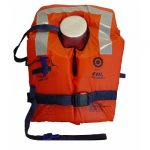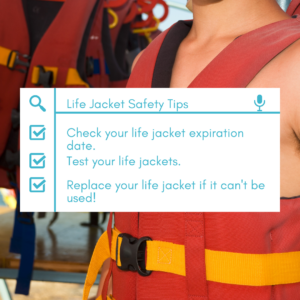
Have a life jacket with you whether you are hopping into the lake or onto a boat. Did you know that life jackets have an expiration date? If you have life jackets that haven’t been in the water recently, check to see if they are safe! You should know that any life jackets or personal floatation devices you use are going to work.
At AquaMobile, we want to educate everyone about water safety. Now let’s review the importance of checking your life jacket’s expiration date and how to know when it’s time to upgrade.
Do Life Jackets Expire?
There are two main types of lifejackets. These are foam and inflatable life jackets. The life jacket itself does not expire. The material of the best loses its ability to float in water. Time to compare each of the types of materials.
Foam:
- Comes as is
- Damaged by wear and tear and loses buoyancy
- Keep in dry and cool areas
Inflatable:
- Uses carbon decide (CO2) tank to inflate
- Has tank replacement date with 1-3 year life span
- Tank damaged by dirt or corrosion over time
There are pros and cons to each type of life jacket. Keep both of these things in mind when you go to purchase one for you or your child. Although neither of them is perfect, staying safe in the water is the entire point of wearing a life jacket.
How to Test Your Life Jackets
Always test out any life jacket before using it to swim or ride on a boat. Foam and inflatable life jackets can lose their ability to float over time.
Test foam life jackets by putting them on and floating and in calm or confined water conditions. The vest should fit properly when you float in the water. It should not rise above your shoulders when in the water. The foam inside has lost its buoyancy if you cannot float safely in the water
Follow the same process with inflatable life jackets. It should be snug, but not too tight. Look at when the CO2 tanks expire. This replaces making sure the foam jackets float.
Remember…
These are some of the measures you can take to stay safe in the water. A working life jacket should be one that’s approved by your local authorities that vary from country to country. The right life jacket can make a huge difference in the event of an emergency.
Consider taking private swimming lessons. Alongside a life jacket, knowing how to swim can help you stay above the water until help arrives. In the open water, it’s easy to get pulled out by the current. So swim with a buddy and avoid going out too far.
We hope these tips help you stay safe this summer!
Let us know what you think in the comments below!




